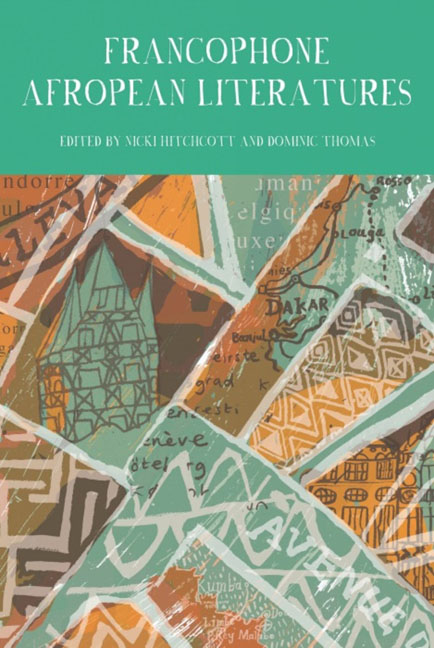Book contents
- Frontmatter
- Contents
- Introduction: Francophone Afropeans
- Essays
- Afropeanism and Francophone Sub-saharan African Writing
- The Transatlantic Poetics of Fatou Diome
- Corps Sans Titre: ‘Fleshiness’ and Afropean Identity in Bessora's 53 Cm
- Already Here: Sami Tchak's Afropean Generation
- Paris Polar: Afropean Noir in the City of Light
- Mapping Afropea: The Translation of Black Paris in the Fiction of Alain Mabanckou
- Relighting Stars and Bazaars of Voices: Exchange and Dialogue in Leonora Mianos Tels Des astres eteints and Alain Mabanckous Black Bazar
- Sex and the Afropean City: Léonora Miano's Blues Pour Élise
- Towards an Afropean Cosmopolitanism: Hospitality, Friendship and the African Immigrant
- Afropean Masculinities as bricolage
- Short Stories
- Notes on Contributors
- Index
Mapping Afropea: The Translation of Black Paris in the Fiction of Alain Mabanckou
from Essays
- Frontmatter
- Contents
- Introduction: Francophone Afropeans
- Essays
- Afropeanism and Francophone Sub-saharan African Writing
- The Transatlantic Poetics of Fatou Diome
- Corps Sans Titre: ‘Fleshiness’ and Afropean Identity in Bessora's 53 Cm
- Already Here: Sami Tchak's Afropean Generation
- Paris Polar: Afropean Noir in the City of Light
- Mapping Afropea: The Translation of Black Paris in the Fiction of Alain Mabanckou
- Relighting Stars and Bazaars of Voices: Exchange and Dialogue in Leonora Mianos Tels Des astres eteints and Alain Mabanckous Black Bazar
- Sex and the Afropean City: Léonora Miano's Blues Pour Élise
- Towards an Afropean Cosmopolitanism: Hospitality, Friendship and the African Immigrant
- Afropean Masculinities as bricolage
- Short Stories
- Notes on Contributors
- Index
Summary
Translations of Francophone material in the ‘Harlem Renaissance’ give evidence of black modernity and perhaps most important show the ways that ‘race’ actually transcends the nation–state […]. But at the same time, translations open ‘race’ to the influence of an exterior, pulling and tugging at that same signified in an interminable practice of difference, through an unclosed field of signifiers (Negro, noir, black, nègre, Afro–American, Aframerican, Africo–American, Afro–Latin, etc.) whose shifts inescapably reshape the possibilities of what black modern culture might be.
Brent Hayes Edwards, The Practice of DiasporaIn Alain Mabanckou's first novel, Bleu–Blanc–Rouge (1998; Red White Blue, 2013), the hero–in–training, Massala–Massala, learns a tough lesson from his mentor, Charles Moki. ‘On ne devient pas parisien du jour au lendemain ou parce qu'on habite à Paris. C'est une affaire de longue haleine’ [One does not become Parisian from one day to the next or because one lives in Paris. It's a long–term project] (1998: 75). On the surface, one could read in Moki's observation the idea that the identity so prized by these two Congolese immigrants owes more to a state of mind than it does to residence. However, the becoming parisien is less a becoming French than it is the acquisition of a particular (and masculine) Congolese style that makes visible a state of being in Paris. Moki refers to the time it takes to obtain the material trappings – the vestimentary style of the SAPE, or the Société des Ambianceurs et des Personnes Elégantes – that articulate a flashy sense of belonging for the immigrant who must then return to the Congo to close the circle of identification that is the parisien (Thomas, 2003). As several of Mabanckou's characters have joked, the clothes do make the parisien, and this attempt to dress up the French capital with a pair of Weston shoes and a Versace suit comes as no surprise to the reader, nor do the lengths Massala–Massala will go to achieve such status.
The first line of the novel, ‘j'arriverai à m'en sortir’ [I'll manage to pull through] (Mabanckou, 1998: 9), uttered by Massala–Massala in a French detention centre not long before his deportation back to the Congo, is an ambiguous statement that actually foreshadows a failure of arrival.
- Type
- Chapter
- Information
- Francophone Afropean Literatures , pp. 95 - 109Publisher: Liverpool University PressPrint publication year: 2014



